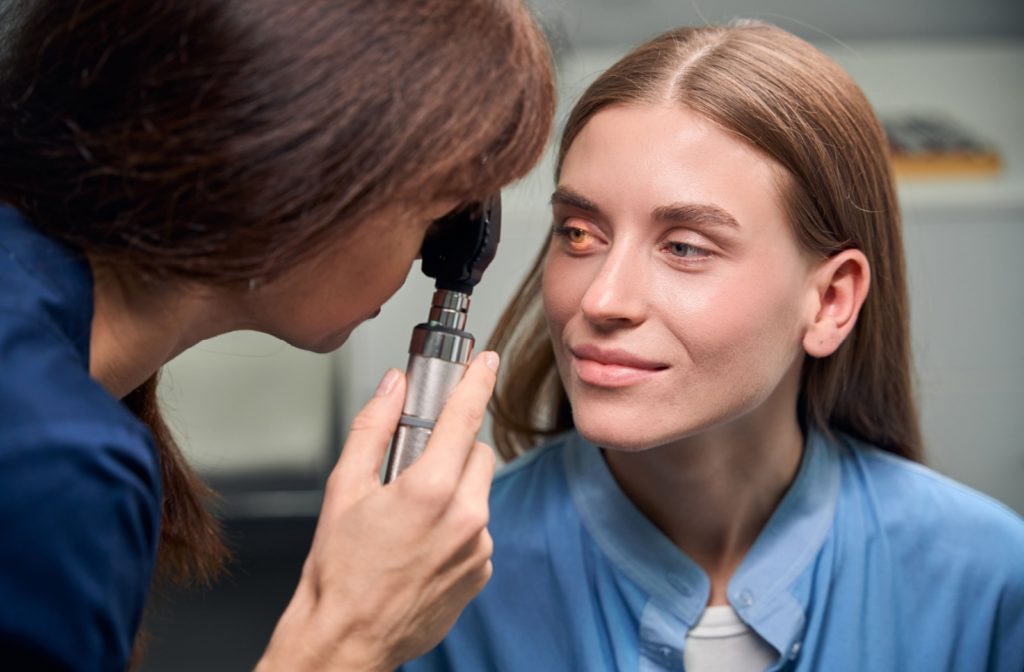A retinal detachment is a serious condition that requires prompt medical attention. When the retina—a thin layer of tissue at the back of your eye—pulls away from its normal position, it can threaten your vision if left untreated.
Thanks to advancements in eye care, surgery today offers a high success rate in repairing detached retinas and preserving sight. However, recovery takes time and depends on multiple factors.
If you’ve recently undergone or are preparing for retinal detachment surgery, understanding what to expect during recovery can make all the difference. Calgary Optometry Centre is here to help you through this experience.
Typical Recovery Timeline
The recovery period after retinal detachment surgery varies, but most patients need several weeks to a few months to fully heal. Here’s a general outline of what you can expect:
Immediately After Surgery (Days 1–7)
Following the procedure, you will likely experience discomfort, swelling, and blurry vision. These symptoms are normal as your eye begins healing. Your ophthalmologist may prescribe eye drops to prevent infection and control inflammation.
During this time, you’ll also be advised to avoid strenuous activities and follow specific instructions, such as maintaining a particular head position, especially if a gas bubble is used during surgery to support the retina.
First Few Weeks (Weeks 1–4)
Over the next few weeks, you may start seeing gradual improvements in your vision. Depending on the type of surgery performed, the healing process can differ slightly. It’s common for your eye to remain red or sensitive for a few weeks. Patients may also experience temporary visual disturbances, which should diminish with time.
Full Recovery (Weeks 6–12 & Beyond)
Most patients experience significant healing within a year of surgery, though it may take longer for vision to stabilize. Even after the retina has been successfully reattached and healed, eyesight may not return to its pre-detachment level. Some people may need glasses or additional treatments to improve their vision.
Factors That Affect Recovery Time
Every eye heals differently, and recovery timelines can vary based on factors, including:
- Type of surgery: The specific procedure used to repair the detachment affects recovery speed. For instance, healing from pneumatic retinopexy (an outpatient procedure involving a gas bubble) may be faster than recovery from more invasive surgery, such as a vitrectomy or a scleral buckle.
- The extent of retinal damage: If the detachment affected only a small portion of your retina and was treated promptly, you’re more likely to recover quickly. Larger, more complex detachments usually require extended healing time.
- Age and overall health: Younger patients and those in good general health tend to heal faster. Conditions like diabetes or other underlying health issues can slow down the healing process.
- Adherence to post-surgical instructions: Recovery is highly dependent on following your surgeon’s guidelines, such as using prescribed eye drops, avoiding activities that increase eye pressure, and attending all follow-up appointments.

Tips for a Smooth Recovery
While patience is key, there are proactive steps you can take to support your recovery and maximize your healing, including:
- Resting your eyes: During the initial days after surgery, minimize screen time and avoid reading or other activities that strain your eyes.
- Following head positioning guidelines: If your procedure involves a gas or silicone bubble, you might need to maintain a specific head position for extended periods to help the retina stay in place.
- Using medications as directed: Prescribed eye drops are essential for preventing infection, reducing inflammation, and aiding recovery. Take them exactly as instructed, and don’t skip doses.
- Avoiding physical strain: Activities like lifting heavy objects, bending over, or intense exercise should be avoided for at least a few weeks. These actions can increase pressure inside your eye and slow down recovery.
- Protecting your eyes: Use sunglasses when outdoors and avoid environments with high dust or smoke. This helps shield your eyes from light sensitivity and potential irritants.
- Monitoring for complications: Watch closely for symptoms like severe pain, sudden vision loss, flashes of light, or new floaters. These could indicate complications, such as retinal re-detachment or infection, and require immediate medical attention.
- Attending follow-up appointments: Regular check-ins with your ophthalmologist and optometrist are critical. These visits help check that everything is healing as expected and allow your doctor to address any concerns promptly.
Potential Complications During Recovery
While most people recover without issues, there are some risks associated with retinal detachment surgery that you should be aware of:
- Re-detachment: The retina may detach again, especially if the initial detachment was severe or accompanied by other eye conditions.
- Cataract formation: Some patients, particularly those who undergo vitrectomy, may develop cataracts more quickly post-surgery.
- Eye pressure changes: Abnormal increases or decreases in eye pressure can occur and may require additional treatments to manage.
- Scar tissue (proliferative vitreoretinopathy): In some cases, scar tissue develops on the retina, which can pull on it and cause another detachment. Treatment usually involves further surgery.
Recognizing these potential complications early and seeking prompt medical care can help minimize their impact on recovery.
The Importance of Comprehensive Eye Care
Navigating recovery from retinal detachment surgery isn’t just about healing from the procedure—it’s about safeguarding your overall eye health for the future. Regular eye exams can detect early signs of retinal detachment or other conditions and improve your chances of effective treatment.
At Calgary Optometry Centre, we are committed to helping patients protect their vision through modern technology and personalized care. Our experienced team understands the importance of follow-up care and will work with you throughout your healing process to help your sight remain as clear and healthy as possible.If you’re experiencing vision changes or have questions about your recovery, don’t hesitate to reach out. Whether you need support during recovery or are looking for routine eye care, book an appointment today.




